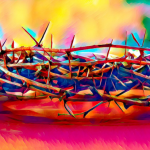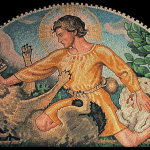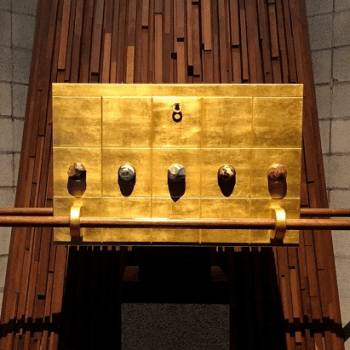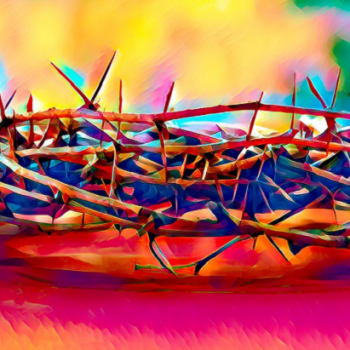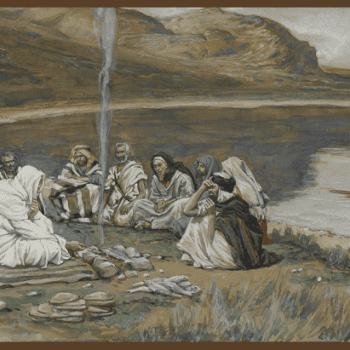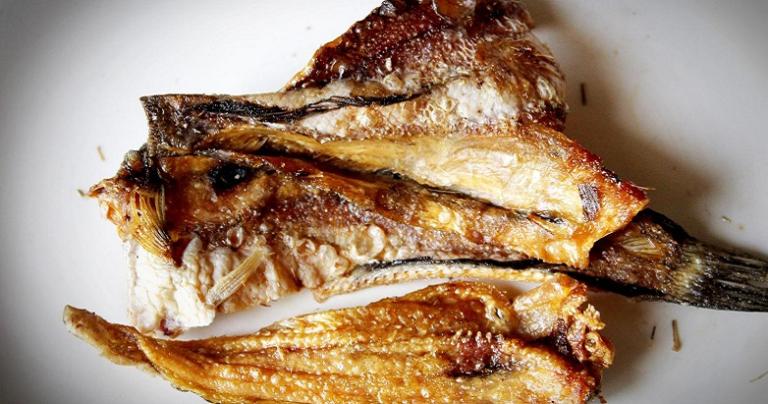
While they were still incredulous for joy and were
amazed, he asked them, “Have you anything here
to eat?” They gave him a piece of baked fish;
he took it and ate it in front of them.
For the Third Sunday of Easter: Acts 3:13-15,17,19; 1 John 2:1-5a; Luke 24:35-48.
Today in the Gospel, it is still Easter Sunday.
Christ, in the newness of his resurrection, presents himself for the first time at a gathering of his followers.
The first thing he wants is to give them peace.
He stands in their midst and says to them: Peace be with you.
Then he begins to unfold for them what peace is.
First, he tells them to touch and feel his real flesh and solid bones.
He also asks for real bodily food.
They gave him a piece of baked fish.
He takes it in his hands, bites it, chews it, swallows it.
Proof of the Risen One’s holy communion with us in having real flesh and blood!
The peace that the Lord God newly risen in flesh and blood wants to unfold for his followers is first of all peace between God and the human body.
That may sound odd, until we recall that In the Beginning God himself took earth, and from it he formed the physical human body first— and then he breathed into it spiritual, personal life.
The body is innocent, having come from the hands of God.
It was the will— the spirit of the human person— even though it comes from the breath of God—it was the free, human, spiritual will that later chose, and sinned and corrupted.
The Risen Christ is peace in human flesh and blood— that is, God both giving and being: unbroken and unbreakable welcome, communion and blessing upon the human body.
The second unfolding of peace that the newly risen Christ gives to his assembled followers is peace for the human spirit.
Thus it is written that the Christ would suffer and rise from the dead on the third day and that repentance, for the forgiveness of sins, would be preached in his name to all the nations….
Just as sin was the beginning of bodily death in human history, so the forgiveness of sins is the beginning of new life for the human spirit and human history.
Christ— the Resurrection and the Life— sends his followers on a mission of preaching repentance— a new mindset, new behavior, a new outlook— repentance for the forgiveness of sins.
The first and second readings before the Gospel today make that preaching present.
The First Letter of Saint John and the book of the Acts of the Apostles both obey today’s Gospel of the Risen Lord, and they preach repentance for the forgiveness of sins.
But if anyone does sin, we have an Advocate with the Father, Jesus Christ the righteous one. He is expiation for our sins, and not for our sins only but for those of the whole world.
Repent, therefore, and be converted, that your sins may be wiped away.
The Resurrection of Christ in flesh and blood is peace for both the human body and the human spirit.
It seems, on the one hand, that the welcome and communion and blessing of peace that God gives the human body in the Flesh and Blood of the risen Christ is as concrete as our bones and as simple as eating a piece of baked fish.
On the other hand, the peace that the bodily resurrection of Christ our God gives to our human spirits is not as simple.
It needs more unfolding: repentance— a new mindset, new behavior, a new outlook— repentance for the forgiveness of sins.
God risen in Flesh and Blood freely offers the peace of forgiveness to our spirits that have chosen to sin.
Yet, without repentance our spirits do not begin to touch the bones of forgiveness.
Without repentance our spirits do not begin to eat the food of forgiveness.
That is what he tells his followers in his Gospel today.
Thus it is written that the Christ would suffer and rise from the dead on the third day and that repentance, for the forgiveness of sins, would be preached in his name to all the nations….
That is what his followers taught and wrote for us their fellow followers today.
But if anyone does sin, we have an Advocate with the Father, Jesus Christ the righteous one. He is expiation for our sins….
Repent, therefore, and be converted, that your sins may be wiped away.
We have the same unfolding of peace and the same order of unfolding in the Eucharist of the Risen Christ.
Flesh and blood first, and then from those: the forgiveness of sins.
Take this, all of you, and eat of it, for this is my Body, which will be given up for you.
Take this, all of you, and drink from it, for this is the chalice of my Blood … which will be poured out for you … for the forgiveness of sins.
Today in his Gospel, in his Resurrection and in his Eucharist, Christ unfolds peace for us.
Peace— welcome, communion, blessing— for our entire human nature: body and spirit.
God loves all of us, and God loves our all.
His love, his peace, his welcome, his communion, his blessing, his forgiveness— these are also a vocation of highest dignity.
Repent, therefore, and be converted, that your sins may be wiped away.
May God our Father grant that we, whom he nourishes by the Body and Blood of his Son and fills with his Holy Spirit, may become one body, one spirit in Christ.
Peace be with you!
Turn. Love. Repeat.

